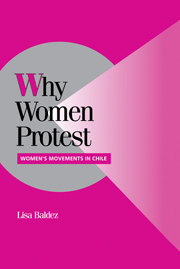Book contents
- Frontmatter
- Contents
- List of Figures and Tables
- Preface
- 1 WHY WOMEN PROTEST: TIPPING, TIMING, AND FRAMING
- 2 MOTHERS OF THE COLD WAR, DAUGHTERS OF THE REVOLUTION: A HISTORICAL OVERVIEW OF WOMEN AND CHILEAN POLITICS
- Part One Women Against Allende
- 3 THE REVOLUTION HITS HOME: WOMEN ORGANIZE AGAINST ALLENDE
- 4 CATAPULTING MEN TO ACTION: THE MARCH OF THE EMPTY POTS
- 5 “FEMININE POWER” AND THE END OF THE SOCIALIST REVOLUTION
- Part Two Women Against Pinochet
- References
- Index
4 - CATAPULTING MEN TO ACTION: THE MARCH OF THE EMPTY POTS
Published online by Cambridge University Press: 06 July 2010
- Frontmatter
- Contents
- List of Figures and Tables
- Preface
- 1 WHY WOMEN PROTEST: TIPPING, TIMING, AND FRAMING
- 2 MOTHERS OF THE COLD WAR, DAUGHTERS OF THE REVOLUTION: A HISTORICAL OVERVIEW OF WOMEN AND CHILEAN POLITICS
- Part One Women Against Allende
- 3 THE REVOLUTION HITS HOME: WOMEN ORGANIZE AGAINST ALLENDE
- 4 CATAPULTING MEN TO ACTION: THE MARCH OF THE EMPTY POTS
- 5 “FEMININE POWER” AND THE END OF THE SOCIALIST REVOLUTION
- Part Two Women Against Pinochet
- References
- Index
Summary
Nearly every one of the scores of books written about the Popular Unity (UP) period mentions the March of the Empty Pots, but few devote more than one or two sentences to it. Yet this event played a pivotal role in shaping the future course of the Allende government. The March of the Empty Pots demonstrated a significant lack of middle-class support for Allende's peaceful revolution and sent a signal of domestic discontent to observers around the world. Women organized the protest at a moment when the opposition parties were poised to take definitive action against the government, in the face of a growing climate of crisis and instability. They timed the march to coincide with the end of Fidel Castro's three-and-a-half week visit to Chile. The march set off a series of events that changed the fate of both the opposition and the government in significant ways. The outbreak of violence during the protest prompted President Allende to declare a state of emergency in Santiago and united the opposition parties in an effort to impeach one of Allende's top cabinet ministers. Male party leaders framed their cooperation as a response to women's actions throughout the remainder of the Allende era. They would continue to invoke women's participation as a way to sustain unity within this new coalition. The impact of the March of the Empty Pots stemmed from the fact that it occurred at a moment when these parties were primed to ally with one another.
- Type
- Chapter
- Information
- Why Women ProtestWomen's Movements in Chile, pp. 76 - 97Publisher: Cambridge University PressPrint publication year: 2002



